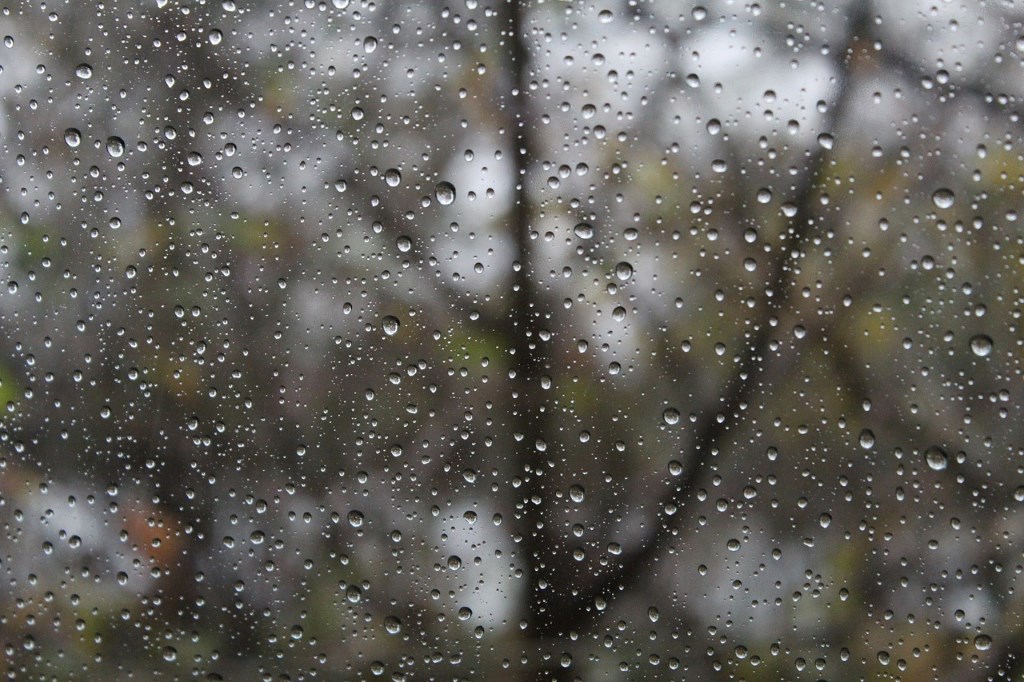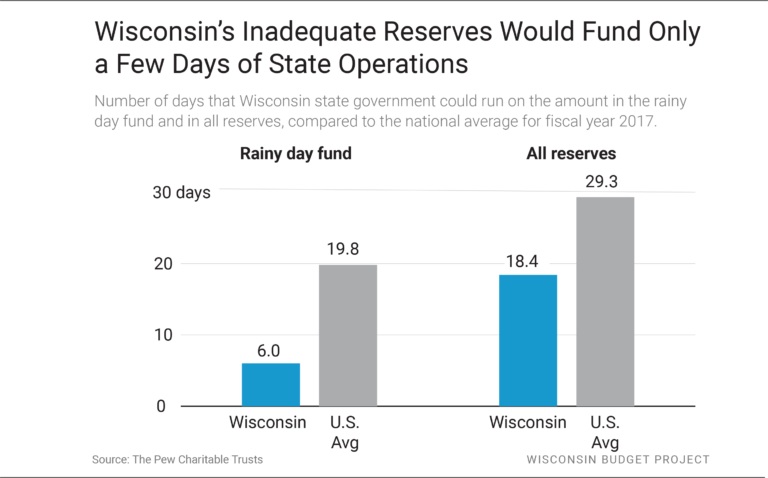State Rainy Day Fund Trails 35 States
Would last six days. Ranks 37% below national average.
Wisconsin lawmakers talk a lot about fiscal responsibility, but they have a long history of not following through on their professed interest in sound budget planning. The current legislative session provides another example of why our state is well behind most others in building up reserves and preparing for the next economic downturn.
Short-sighted budget choices hurt the state’s economy and its children and families over the longer haul. These choices undermine our readiness to respond to future downturns and our ability to make the sorts of long-term investments that would have the biggest pay off for Wisconsin’s schools, workforce, and communities.
A recent report by the Pew Charitable Trusts examines state rainy day funds and other state reserves and shows that even though most states have inadequate reserves, Wisconsin has done even less to prepare for the next recession. As the following graph illustrates, at the end of the 2016-17 fiscal year Wisconsin’s rainy day fund was only large enough to finance 6 days of state expenditures, which was 39th nationally. The average rainy day fund in all states was more than three times as long, at 19.8 days, and even that is below the level of reserve funds that many budget experts recommend.
Wisconsin’s total General Fund reserves (i.e., the rainy day fund plus the budget balance) would last the state just 18.4 days. Even though Wisconsin finished the 2016-17 fiscal year with a much larger budget balance than had been anticipated, the Pew report indicates that our state ranked 36th nationally and was 37% below the 50-state average.
Wisconsin’s readiness for another recession is on track to get much worse over the next year because the Governor and legislative leaders are intent upon spending down the state’s modest budget balance. Bills that have been approved and others that are pending would dig the state into a substantial budget hole by making two basic mistakes that put short-term political gain ahead of long-term fiscal responsibility:
- First, during the period of economic recovery between recessions, Wisconsin lawmakers often neglect to build up the budget reserves that will be needed in the next economic downturn. That unfortunate habit was repeated in the 2017-19 budget bill. As we pointed out in a recent blog post, it has now been five years since the state added to its rainy day fund.
- Second, when Wisconsin lawmakers find during an election year that the state is on track to have a larger budget balance than they had anticipated, they have a bad habit of not only drawing down the projected surplus – through tax cuts and/or increased spending—but doing so in a way that creates a significant gap between future revenue and future spending commitments.
The good news this year is that budget projections released by the Legislative Fiscal Bureau in January estimated the state is on track to finish the 2017-19 budget period with a General Fund balance of $138 million more than was anticipated when lawmakers passed the two-year budget last year. The bad news is that the improvement in the state’s budget almost immediately triggered the Governor and legislators to make unsustainable plans for using the anticipated “surplus.”
As the Milwaukee Journal Sentinel reported a few weeks ago:
From new prisons to tax cuts for parents, Wisconsin lawmakers are rushing to pass hundreds of millions of dollars in new commitments in their final days of work.
The Journal Sentinel article tallied more than $700 million of costs from state tax cuts and new spending, and that was before the announcement by the Governor of a $100 million grant program for school safety. It’s still unclear how many of the proposed tax cuts and spending increases will pass before the legislature wraps up its work for the year, which might happen as soon as this week.
The combined effect of approving all of them would be a very sharp reduction in the state’s budget reserves and would add to the budget hole that state policymakers will face when they reconvene in 2019.
The next week or two in the legislature will determine whether Wisconsin lawmakers protect the modest gains in the state’s budget reserves, or whether they once again make nearsighted choices that undermine the state’s fiscal health. The latter path could impair the state’s ability next session to make long term investments that benefit Wisconsin children, families and communities.
Wisconsin Budget
-
Charting The Racial Disparities In State’s Prisons
 Nov 28th, 2021 by Tamarine Cornelius
Nov 28th, 2021 by Tamarine Cornelius
-
State’s $1 Billion Tax Cut Leaves Out 49% of Taxpayers
 Sep 21st, 2021 by Tamarine Cornelius
Sep 21st, 2021 by Tamarine Cornelius
-
TANF Program Serves a Fraction of Poor Families
 Aug 30th, 2021 by Jon Peacock
Aug 30th, 2021 by Jon Peacock























And Scott Walker calls this #AccountableGov in his Twitter account. He has no shame.